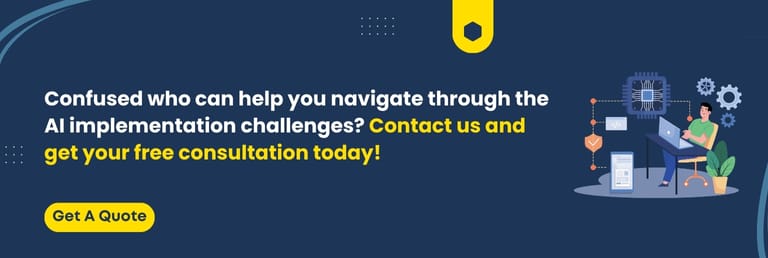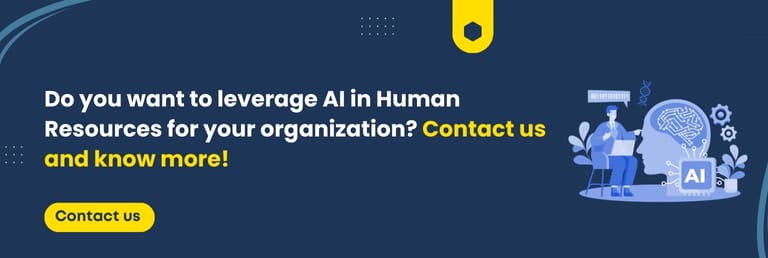The Role of AI In HR In Transforming The Workforce For 2024 And Beyond
Keyur Patel
September 12, 2025
11 min
“AI is moving from traditional HRSS admin up to HRAI is moving from traditional HRSS admin up to HRBP work – using virtual assistants who provide us with cognitive insights, like Alexa. It’s going to happen faster and harder than HR people are ready for” – Laurence Collins, Deloitte.
What, How, and Why questions are common when discussing the revolutionary role of AI in Human Resources. For example,
- What will AI in Human Resources help you achieve?
- How will AI for employee management, AI for talent acquisition, and AI recruitment help HR teams in driving success?
- Why is it important to use AI in Human Resource operations?
The use of transformational technology AI and predictive analysis can simplify activities for recruitment and employee management teams. However, since the technology is relatively new, its repercussions are yet to be questioned. Some consider it a shift of roles, while few consider it a net loss. Well, let’s clear the air as we discuss this topic and answer all your questions about it.
AI in Human Resources
Artificial Intelligence is a disruptive technology and has been used in HR functions for quite some time now. The integration of Machine Learning algorithms and the use of generative AI in content creation will enhance the productivity and performance of the HR functions. AI solutions empower human resource teams by providing them with more accurate and data-driven insights.
While, on the other hand, the implementation will also pose challenges to human resource teams and the management which we will acknowledge later.
Stats to back our thoughts
According to an Aon survey, 400 HR professionals conveyed that HR functioning areas like people analytics, talent recruitment, learning, and development would benefit the most from AI.
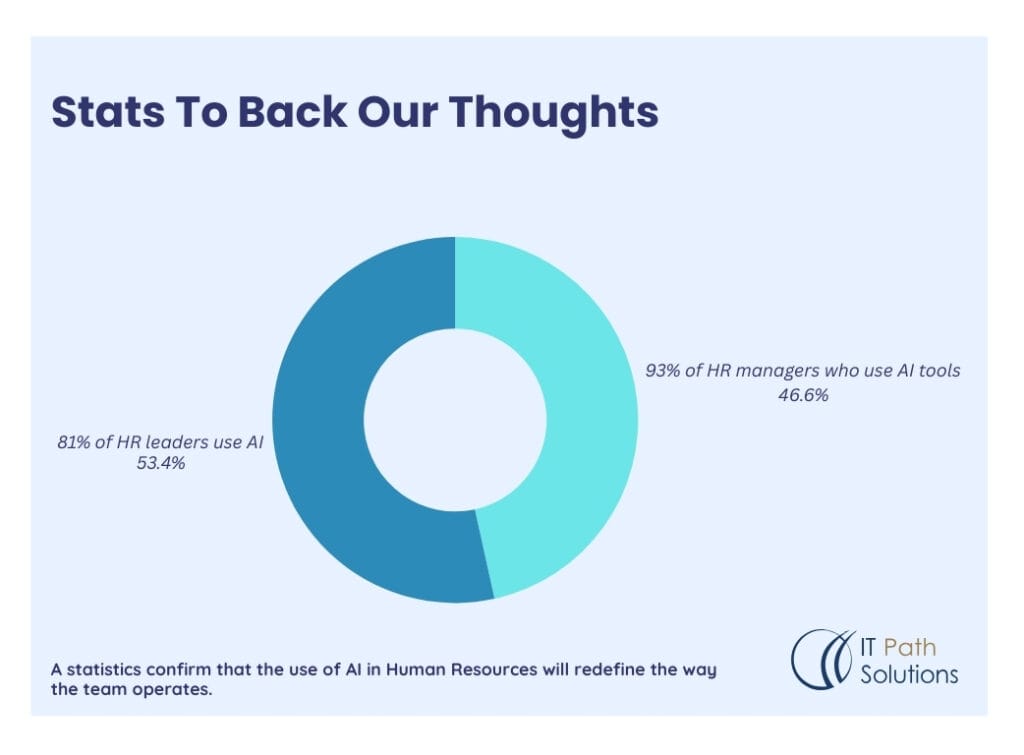
A few other statistics that support the AI benefits thought are:
- 81% of HR leaders use AI to improve organizational efficiency;
- 93% of HR managers who use AI tools believe that it will help them save costs;
- Screening and Assessment capabilities will be improved by using AI in recruitment.
The above statistics confirm that the use of AI in Human Resources will redefine the way the team operates.
Let us look at how you can practically employ AI in Human Resources
Recruitment
AI for talent acquisition: AI tools can serve for talent recruitment and acquisition. AI recruitment can help you scan resumes, analyze a candidate’s response, and evaluate if S/he fits the job profile the team seeks.
The AI-based HR solutions can help management hire without being biased, thereby increasing the chances of bringing in diverse candidates. There are a few other things that can be achieved using recruiting tools.
- HR management teams can simplify the candidate’s job application process;
- One can automate a candidate’s interview scheduling;
- By using AI Chatbots HR, teams can deliver on-time response;
- Even customize communication; etc.
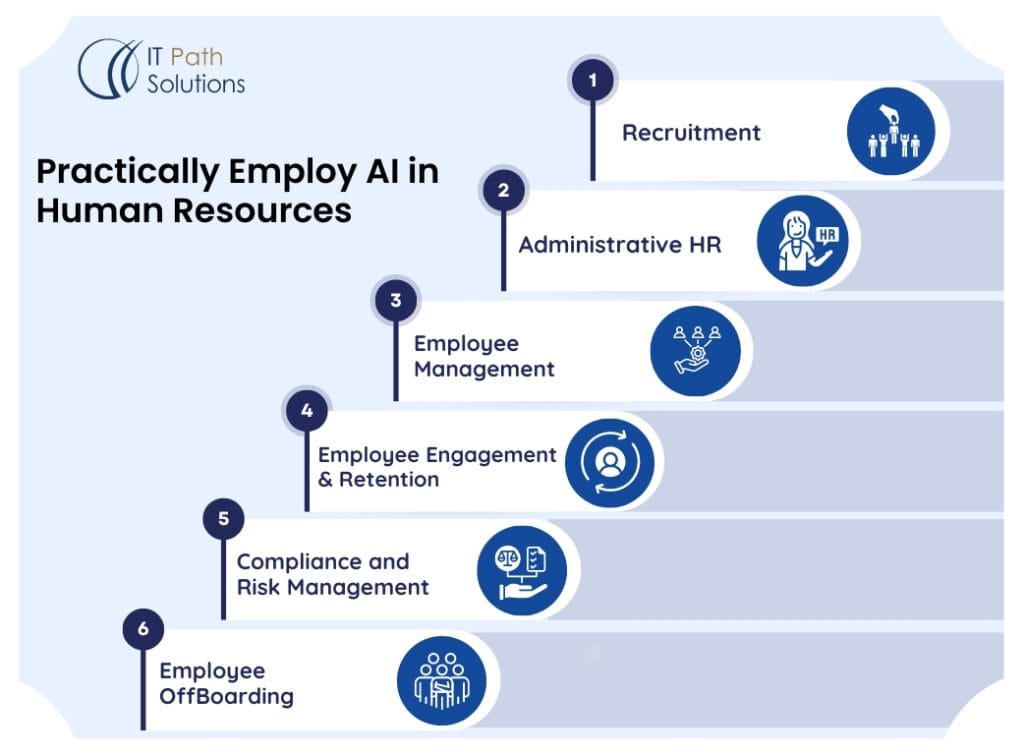
HR Automation can help you shake off some responsibilities from HR teams who are constantly engaged in answering inquiries and struggling to bring people on board.
Administrative HR:
“ AI will augment HR and give HR time to work on more strategic business issues. The opportunity is to use AI to streamline HR manual processes and provide a more consumer-grade service to employees” – Jeane Miester, Coauthor, The Future Workplace Experience
It is a perceived notion that administrative tasks can only be handled by humans. But, do you know that with AI and automation, a lot of time-consuming tasks such as automated resume screening, data management, candidate communication, meeting scheduling, etc can be managed at your fingertips?
Also, Data Analytics in HR is capable of collecting, updating, and maintaining data sets and also ensuring minimal error while doing it. These are the small but valuable tasks that can be achieved with AI implementation.
Employee management:
AI performance management serves as an effective tool for employee management. Using AI, HR teams can assess the performance of every individual within the company. This captured data can be used to identify skill gaps and using the analysis, managers can suggest an employee upskilling program that can help them perform better.
Further, these AI tools can be used to assess the well-being of an employee. Based on the workload insights that the tool collects, management can help in creating a healthy work environment.
Employee engagement and retention:
AI algorithms can be trained to analyze employee performance, track progress in training, and identify feedback trends. Based on the data, HR teams can predict whether an employee’s performance is on an upward or downward trajectory. If the performance is declining, then the team can help in finding the solution. HR can implement personalized solutions, plan activities, and ensure the job satisfaction of the respective employees.
This approach helps re-engage disengaged employees, boosting their productivity and increasing the chances of retention.
Compliance and Risk Management:
Companies can use AI tools to automate documentation tasks involved in employee onboarding. From filling up employee tax forms to distributing handbooks and managing payroll requirements, AI can help the team achieve anything that is traditionally manually managed.
By automating some of these daily activities, HR teams can have sufficient time to focus on strategic decision-making and managing employee relationships.
Offboarding
AI tools can also handle employee offboarding efficiently. For example, HR teams can automate feedback collection forms, track exit interviews, manage handovers, etc. However, this is extremely beneficial in huge companies where there is a workforce of 1500-2000 and the HR team can not personally manage each of the tasks.
Incorporating AI into HR processes streamlines every process, from onboarding to offboarding, allowing teams to focus on more strategic functions. As companies grow, AI becomes an essential tool for managing tasks efficiently while enhancing the employee experience.
Learn More:- The Role of AI In Inventory Management
Benefits of Using AI in Human Resources:
“Anything that involves emotional intelligence is unlikely to ever be replaced. But at the bottom end of the value pyramid – things that are about replicating a process – those will be automated” – Jeremy Campbell, CCO, SDWorx
The crux of the matter is, that AI in HR offers a multitude of benefits, far beyond what one can imagine. It has the potential to enhance the efficiency of HR teams in a transformative way. Let us look at the benefits of using AI in Human Resources.
Time efficiency:
One of the key advantages of using artificial intelligence in HR is its ability to save time. By automating multiple time-consuming & repetitive HR tasks, the team can dedicate their efforts to more strategic, value-adding activities. AI-integrated software use in HR can go beyond the manual capacity and deliver results with precision.
Cost-effectiveness:
Bring automation into the picture, tasks that would typically take a few human hours can be achieved within minutes. As discussed earlier, AI in HR solutions can help the HR teams achieve so much thereby reducing both the need for human efforts and the overall budget required for operations.
Unbiased functioning:
It is often observed that the HR hiring process(worst case scenario) is biased towards hiring a profile, leading to less diverse teams and missing out on the ideal candidate profile. However, AI in HR solutions will bring a drastic change in the way hiring is conducted.
AI-hiring software can be trained to function without biasedness. For example, the “anonymous mode” can be turned on where the names, profile links, gender, etc are kept hidden. This way, only the relevant job criteria are analyzed, and the best candidate is shortlisted. This approach makes it a win-win situation for HR as well as prospective candidates. The automation of tasks reduces biasedness (if any) throughout the process, from resume screening, to interview scheduling, to hiring and onboarding.
Improved employee experience:
AI in HR aids in gap analysis, providing insights into areas where employees may need additional support. This enables HR teams to take timely action and help employees overcome challenges. As a result, workflows become more efficient, and the overall well-being of employees is better maintained.
Challenges and Concerns with AI in HR:
“If you want to go fast, go alone. If you want to go far, go together” -African Proverb.
Artificial Intelligence and Humans will solve some of the biggest recruitment problems. However, it might give rise to potential risks and challenges that we will discuss in the next section.
Role Transformation:
“Artificial intelligence is not a replacement for humans, it is about amplifying human potential: – Amir Husain
It is perceived that AI in Human Resources might replace a few specific roles. For this reason, HR teams must focus on reskilling the existing staff and update the roles of team members accordingly. As AI continues to evolve, reskilling will become a critical component for HR teams to stay relevant and effective.
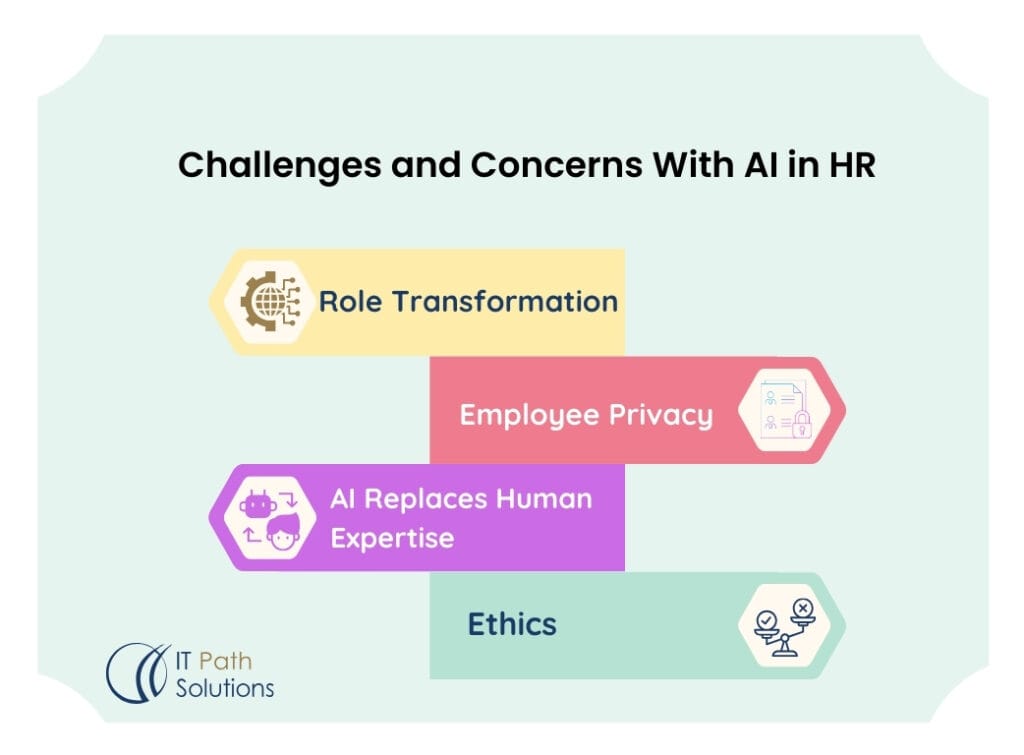
Employee Privacy:
Exposing every data about an employee out there for AI to analyze could jeopardize privacy. This is why preserving employee privacy should be prioritized while implementing AI in Human resources operations.
AI replaces human expertise:
While AI will serve as a valuable tool, HR professionals must learn more about the ways to use these tools effectively. One thing to remember here is, that AI is developed by humans and trained by humans, which means human expertise will always be the top priority. However, the lack of professional upgrades or incompetence in strategically operating AI in HR might lead to job replacements.
Ethics:
In the ever-evolving landscape of AI in HR, the advancement in technology may give rise to ethical issues. It would serve to the company’s benefit to know and keep the team updated about the ethical and legal concerns related to AI.
Read More: The Game-Changing Role Of AI in Supply Chain
Future of AI in HR:
Implementing AI in HR will open up a broad spectrum of opportunities for employees and HR professionals.
“As we design the employee experience, it’s so important to decide when an activity should be done by a lovely warm human being, or when is better to automate it. Get this wrong and the impact on retention and productivity is massive”— Andrew Spence, Glass Bead Consulting
HR professionals need to analyze which roles will change and how. Harnessing the capabilities of AI across the HR ecosystem will help organizations plan things better.
AI integration is going to impact hiring, employee engagement, recruitment and everything HR. you must prepare yourself to embrace the adoption of AI in HR. HR teams can leverage AI-generated data insights to make more informed decisions and operate efficiently.
How to handle AI transformation in HR?
AI unlocks unlimited capabilities in the HR ecosystem, but if you go unprepared, you have lost half of it. Here are a few considerations that will help you in overcoming any challenges involved in implementation.
Streamline AI use with company values:
Leveraging AI will help you deliver personalized experiences, make data-driven decisions, streamline workflows, etc. However, all of these should be achieved while maintaining the highest level of integrity and excellence that sticks to the company’s core values.
The tools that you are planning to use should be carefully vetted to ensure that no biasedness occurs during the hiring process.
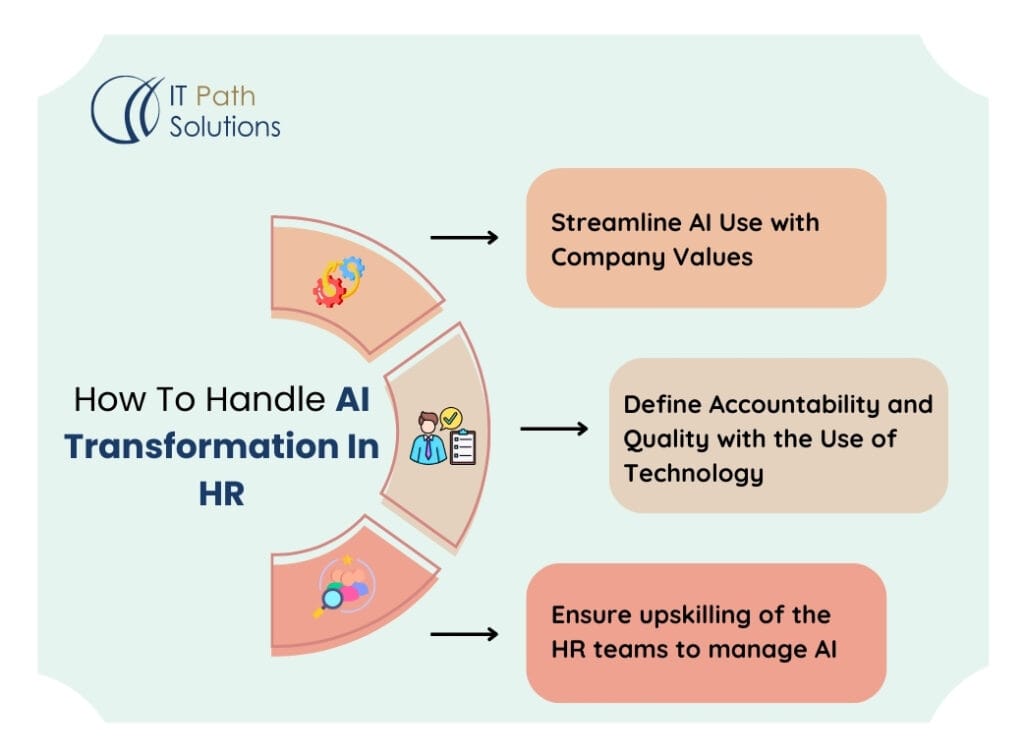
Define accountability and quality with the use of technology:
One needs to define a responsible HR professional who would oversee how AI is used in the company’s premises. The accountable person will also be responsible for mitigating any errors or harm that automation may cause in AI implementation.
Ensure upskilling of the HR teams to manage AI:
AI and humans will have to work parallelly to bring the best of both worlds. AI should be trained to complement HR operations in a way that fosters a culture where it helps employees learn new skills and work toward progress.
Conclusion
It is anticipated that AI integration in HR will bring more improvements to HR methodologies and operations. To extract out full benefits of using AI in Human Resources, HR teams will have to level up their game and establish best practices that will ensure a smooth transition. Let the best practices guide the way!
If you have any more questions on AI integration in your existing HR system, please contact us!
Keyur Patel
Co-Founder
Keyur Patel is the director at IT Path Solutions, where he helps businesses develop scalable applications. With his extensive experience and visionary approach, he leads the team to create futuristic solutions. Keyur Patel has exceptional leadership skills and technical expertise in Node.js, .Net, React.js, AI/ML, and PHP frameworks. His dedication to driving digital transformation makes him an invaluable asset to the company.
Get in Touch
Search
Blog Categories
